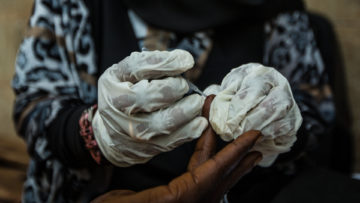Pratik Pawar in Undark:

In June 2017, Betty Balikagala traveled to a hospital in Gulu District, in northern Uganda. It was the rainy season: a peak time for malaria transmission. Balikagala, a researcher at Juntendo University in Japan, was back in her home country to hunt for mutations in the parasite that causes the disease.
For about four weeks, Balikagala and her colleagues collected blood from infected patients as they were treated with a powerful cocktail of antimalarial drugs. After initial analysis, the team then shipped their samples — glass slides smeared with blood, and filter papers with blood spots — back to Japan.
In their lab at Juntendo University, they looked for traces of malaria in the blood slides, which they had prepared by drawing blood from patients every few hours. In previous years, Balikagala and her colleagues had observed the drugs efficiently clearing the infection. This time, though, the parasite lingered in some patients. “We were very surprised when we first did the parasite reading for 2017, and we noticed that there were some patients who had delayed clearance,” recalled Balikagala. “For me, it was a shock.”
More here.
